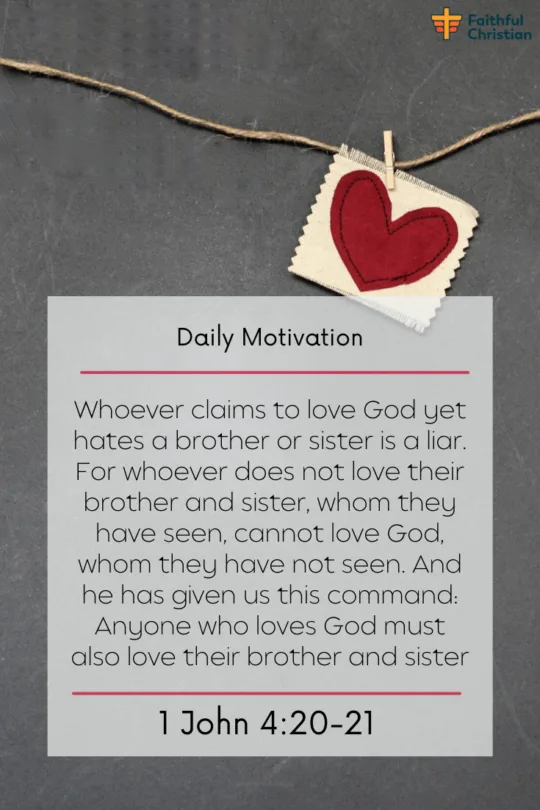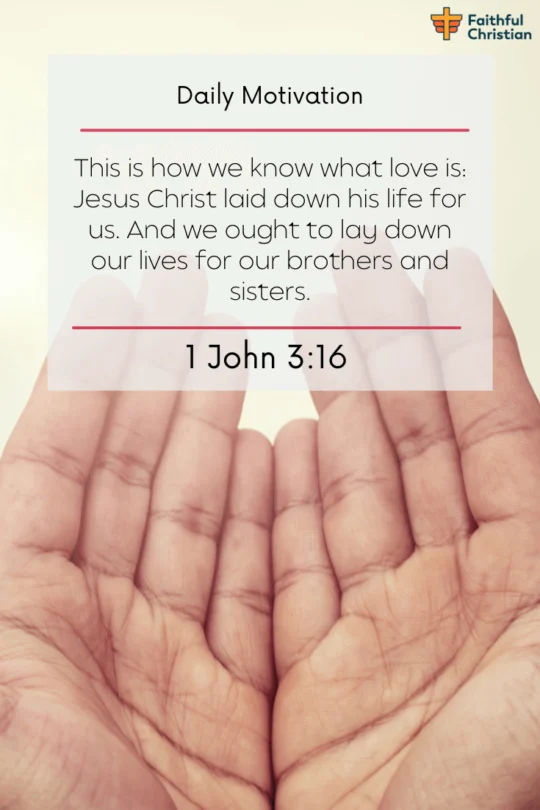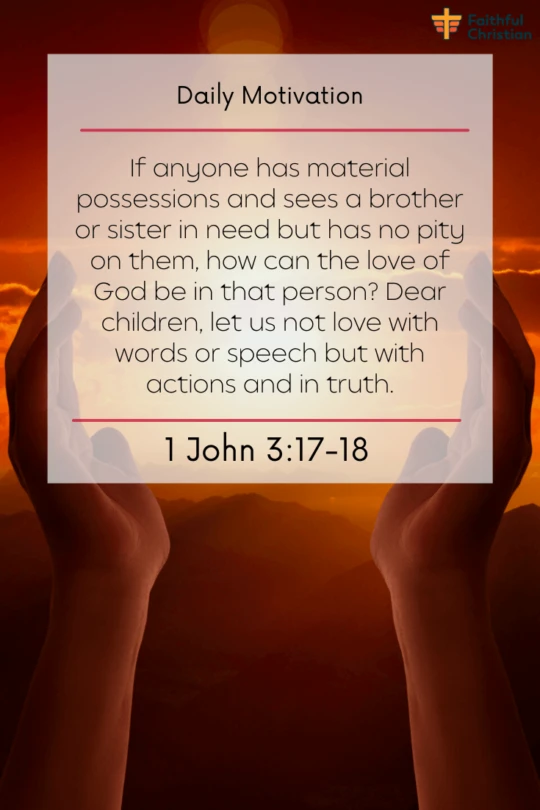Love is the primary binding force in life.
It holds our hearts together with those we care about.
We all love our brothers, sisters, close friends, and parents.
But, how do we treat new friends or strangers?
Do we love them equally the same way we care for our loved ones?
The bible teaches that we should love one another as we love ourselves and go the extra mile to take care of everyone close to us.
And that includes new friends, strangers, college mates, and colleagues at work.
There is no discrimination in God’s eyes. Therefore, each and everyone should be our neighbor’s keeper.
There are no blacks or whites, beautiful or ugly, in God’s eyes.
Thankfully, there are numerous bible verses about loving others equally.
These verses teach us to, without bias, love everyone around us.
So how do you love others equally?
The scriptures teach us that we should consider ourselves in their shoes.
Will I feel happy if I am treated the same way?
I have put together bible verses about loving others unconditionally. Read and be blessed.
Recommended for you
- Love one another: What does it mean?
- 24 Powerful Scriptures About Love Your Neighbor As Yourself
- Bible verse about loving yourself before you can love others
- Bible verse about helping others without recognition
Bible verses about loving others equally

1 John 4:7

Dear friends, let us love one another, for love comes from God. Everyone who loves has been born of God and knows God
What lies at the heart of Christianity? Unconditional, equal love for all. In 1 John 4:7, we find this principle. This verse invites us to love, since love is divine. Love isn’t just a sentiment, but an act and a divine obligation. As children of God, we should embody this love.
Let’s look at the story of the Good Samaritan. A man, robbed and beaten, left by the roadside. Priests, Levites—they passed by. It was the Samaritan, a man of a different culture, who stopped, helped, loved. This wasn’t love confined by social structures or expectations. It was love that leapt boundaries, love that acted.
Now, I want to talk about Mother Teresa. She once said, “Not all of us can do great things. But we can do small things with great love.”
In the slums of Calcutta, amidst poverty and despair, she showed love that knew no boundaries. She tended to the dying, the discarded, not because it was easy or comfortable, but because it was right. It was love in action.
Ephesians 5:2 further emphasizes love as a principle for interaction. It highlights love’s sacrificial nature, mirrored in Christ’s own sacrifice. Love, in this context, becomes a choice, one we should consciously make.
Turning to Proverbs 10:12, it demonstrates love’s transformative power. It tells us love can heal all wrongs, not just some. This is a potent testament to love’s potential to mend relationships and bring peace.
In our daily life, love should guide our actions and words. Imagine a world where responses are driven by love, not impatience or frustration. This shift in perspective unveils the power of love.
In summary, the love originating from God should shape us. It should guide our interactions and decisions. By choosing love, as exemplified by the Good Samaritan and Mother Teresa, we fulfill our divine duty of unconditional, equal love for all.
As we love, we give testament to God’s love for us. Let’s remember this as we journey through life.
1 John 4:8

Whoever does not love does not know God, because God is love
The essence of God is encapsulated in a potent phrase in 1 John 4:8, “God is love.” It’s a fundamental truth that underscores His identity. When we exhibit love, we truly understand God.
This divine love shapes us, influencing how we treat others. It’s an eternal, unwavering force, as highlighted in Psalm 136:26, which proclaims, “His love endures forever.” It remains, regardless of the passage of time.
Embracing this understanding of love elevates our relationships. It prompts us to be kinder, gentler, and more generous. It urges us to mirror God’s love, extending it unconditionally to all.
The story of Jesus and Zacchaeus, the tax collector, vividly illustrates this principle. Tax collectors were despised in their time, seen as traitors and thieves. Yet Jesus, embodying divine love, chose to interact with Zacchaeus. He not only acknowledged him but also dined at his house, extending love and grace.
Jesus didn’t withhold love based on societal biases. His love was, and is, available to everyone, sinners and saints alike.
Now, let’s turn to a modern context, where Martin Luther King Jr.’s life encapsulates this divine principle. Despite widespread discrimination, King embraced a philosophy of love. He extended God’s love to all, demonstrating its power to bridge divides.
Romans 5:8 presents the epitome of God’s love, as it states, “While we were still sinners, Christ died for us.” This highlights God’s love as sacrificial and persistent, offered irrespective of our shortcomings.
Finally, I propose this: Could difficulty in loving others stem from an incomplete understanding of God? God’s love, once fully grasped, prompts us to love others unconditionally.
In conclusion, the quest to understand God’s love is the quest to better love others. As we comprehend His unwavering, sacrificial love, we learn to extend the same grace to those around us.
To truly know God is to love, and to love is to know God.
1 John 4:20-21

Whoever claims to love God yet hates a brother or sister is a liar. For whoever does not love their brother and sister, whom they have seen, cannot love God, whom they have not seen. 21 And he has given us this command: Anyone who loves God must also love their brother and sister
Love, central to Christianity, finds its crux in 1 John 4:20-21. It suggests, “He who does not love his brother, cannot love God.” The profoundness of this statement points to the intertwined relationship of loving God and our neighbors. It’s a double-sided coin.
Recall Matthew 22:39. Jesus, asked about the greatest commandment, responded succinctly. He urged, “Love your neighbor as yourself.” Simple yet demanding. No wonder James tagged it as the “royal law” (James 2:8). It’s a decree straight from the Heavenly Throne.
However, embodying this commandment can be daunting. We occasionally encounter individuals seemingly impossible to love.
Here, 1 John 4:20-21 probes us, questioning how we can love an unseen God while harboring hatred for our visible brothers and sisters. It’s a stern reminder that love transcends feelings—it’s a conscious choice, an action.
The Parable of the Sheep and Goats (Matthew 25:31-46) emphasizes that acts of kindness towards the least privileged are directly recognized as service to God.
The King’s assertion that services rendered to the needy are services to Him underscores the importance of expressing love to others as a reflection of our love for God.
I observe individuals in our communities who exemplify this love. They selflessly volunteer, aiding the less fortunate, expressing their love for God through action.
So, how do we actualize love? We do this through kindness, understanding, patience, compassion, and justice. We lend a helping hand, listen, and share.
Love resides not in grandeur but in small acts of kindness that resonate. It’s about perceiving everyone as equally deserving of love.
In conclusion, when we show love, we not only perform good deeds, but we live out the “royal law.” In doing so, we reflect God’s love. Isn’t it beautiful to be a testament to such love? I believe so.
1 John 5:1

Everyone who believes that Jesus is the Christ is born of God, and everyone who loves the father loves his child as well
Diving into 1 John 5:1, we find two cornerstones of Christianity: faith and love. These concepts, intertwined, define our identity as God’s children and shape our relationships.
Galatians 3:26 underlines this new identity. It tells us that through faith in Christ, we become God’s children. This notion shatters societal barriers, creating a universal, spiritual kinship.
Take the story of Philemon and Onesimus, for example. Here, Paul urges Philemon to welcome Onesimus, a former slave, as a brother in Christ. This equal, unconditional love stems from our shared identity as God’s children.
This spiritual kinship is also evident in Desmond Tutu’s work in post-Apartheid South Africa. Despite the country’s history of division, Tutu championed forgiveness and unity. His actions reflected the belief that we are all children of God, bound by a shared spiritual lineage.
As children of God, we should mirror Him. But how? The answer lies in love. To love God and to love His children are two sides of the same coin. This intertwining of love and faith is echoed in John 1:12. It suggests that our transformation into God’s children comes from receiving and believing in His love.
This love for God and others is more than an optional extra for believers. It is an inherent trait, a defining characteristic. This love is not superficial, but deep and sacrificial. It transcends all boundaries and discriminates against none.
In conclusion, being a child of God isn’t just about personal salvation. It’s about expressing God’s boundless, unconditional love to everyone. The love that changed a slave into a brother, that healed a divided nation, is the love that should define us.
In embodying this love, we truly demonstrate that we are born of God.
1 Peter 1:22

Now that you have purified yourselves by obeying the truth so that you have sincere love for each other, love one another deeply, from the heart.
As we navigate life’s complexities, the powerful verse from 1 Peter 1:22 invites us to pause. It calls us to embrace a sincere, enduring love for each other. Not merely a suggestion, it’s a command to practice love that’s genuine and deep-rooted.
What does this sincere love look like? It’s a commitment that remains unwavering amid life’s storms. It’s more than a surface-level connection. It’s heartfelt affection, underlined by intensity and sincerity.
Love, according to Peter, should be fervent and zealous. It’s a love that’s passionate about honoring others. In fact, Romans 12:10 advocates the same concept. It tells us to value others above ourselves, embodying selfless love.
However, this love isn’t fleeting. As Hebrews 13:1 puts it, “Let brotherly love continue.” Consistency is key. Our love should flow ceaselessly, enduring through every season.
Consider the biblical story of Jonathan and David. Their deep-seated bond exemplified sincere love and mutual respect. Despite adversity, Jonathan’s dedication to David stood firm. This tale, embedded in biblical history, motivates us to exhibit the same level of commitment.
Beyond the Bible, such love exists in the real world too. During crises or disasters, communities unite. They rally to provide emotional and physical support, echoing sincere love and solidarity. It’s this kind of unity that Peter urges us to cultivate.
So, how do we apply these verses practically? By expressing love intentionally, honoring others above ourselves, and remaining consistent. Especially in times of need, it’s crucial to stand by each other.
In conclusion, we’re not called to casual interactions but to love deeply and sincerely. By doing so, we reflect God’s nature, portraying divine love in our human interactions. Through our love, we can truly enhance the world around us.
1 John 2:29

If you know that he is righteous, you know that everyone who does what is right has been born of him
The essence of 1 John 2:29 lies in the link between righteousness and divine birth. It states, “Everyone who does what is right is born of him.” This correlation is profound. It reveals that righteous actions reflect our spiritual rebirth.
Jesus Christ set a high bar in Matthew 5:48. He says, “Be perfect, as your heavenly Father is perfect.” An ambitious goal? Certainly. But it’s an invitation to mirror God’s love, embody His righteousness, and extend unconditional love to others.
Ephesians 5:1 provides guidance on our journey. It tells us, “Follow God’s example, as dearly loved children.” We are cherished children of God. As such, we should mimic our Father’s actions. I contend that experiencing His deep, personal love propels us to love others similarly.
How we treat others showcases our righteousness. Words and deeds should align if we claim divine birth. The biblical scene of Jesus washing his disciples’ feet (John 13:1-17) embodies this principle. He did not merely speak about love. He demonstrated it through service.
Bill and Melinda Gates echo this spirit of service. Through their foundation, they have uplifted lives globally. Their efforts reflect the tangible, practical love that speaks of divine birth. I see their work as a testament to the transformative power of unconditional love.
In conclusion, loving and righteous actions authenticate our divine birth. True righteousness goes beyond following religious norms. It encompasses allowing God’s love to reshape our hearts and influence our actions.
Every act of love brings us closer to emulating God’s righteousness, underscoring our identity as His cherished children. This identity, lived out in our daily lives, provides a glimpse of divine perfection in our imperfect world.
1 John 2:10

Anyone who loves their brother and sister[a] lives in the light, and there is nothing in them to make them stumble
The scripture, 1 John 2:10, serves as a compass. It directs us towards a path of unity, guided by love. It states, “Whoever loves his brother abides in the light, and in him, there is no cause for stumbling.”
Next, let’s draw from Proverbs 3:4. It speaks of kindness and truth as vehicles for favor, both with God and our peers. These traits, when embodied, create a protective shield against negativity. They foster goodwill and respect within our circles.
Romans 13:10 presents another perspective. It illustrates love as a guide that prevents harm. It’s more than an emotion. Love is an expansive force. It fulfills the law, radiating respect and empathy towards our neighbors.
Love emerges as a spiritual luminary in light of these scriptures. Much like a lighthouse, love steers our actions, guiding us clear of misunderstandings and conflicts.
The story of Jesus forgiving those who crucified him embodies the spirit of this verse. His plea, “Father, forgive them, for they know not what they do,” showcases the power of love over hatred. His forgiveness, despite the harm inflicted on him, underscores love’s power as a guiding light.
A real-world instance that mirrors this narrative is the post-Apartheid Truth and Reconciliation Commission in South Africa. It offered forgiveness to individuals responsible for violence. Despite the magnitude of the task, love shone as a guiding beacon towards peace.
So, how do we apply this understanding? It begins with empathy. Understanding others’ struggles and perspectives is essential. It involves extending kindness, regardless of how we are treated. It requires us to consciously shine the light of love, causing no harm.
In summary, 1 John 2:10‘s journey reveals love’s transformative power. It emphasizes love’s role as a spiritual compass.
Whether in biblical narratives or real-world events, love’s light emerges as an unerring guide. It directs us towards unity and harmony.
1 John 3:15

Anyone who hates a brother or sister is a murderer, and you know that no murderer has eternal life residing in him.
1 John 3:15 holds a stark message. It states, “Anyone who hates a brother or sister is a murderer.” This doesn’t mean physical murder. Instead, it highlights the spiritual darkness within hatred. It implies that hatred extinguishes the light of love, akin to murder snuffing out life.
Turning to Jesus’s teachings in Matthew 5:21-22, we see a similar correlation. Jesus interprets the sixth commandment, equating anger with murder. His teachings suggest that even brief anger can be spiritually harmful, much like hatred.
Our role in this equation is also vital. James 4:12 reminds us that God alone is the lawgiver and judge. As humans, we often overstep, assuming the role of judge. Understanding that judgment is God’s prerogative alone can guide us towards unconditional love.
The story of Cain and Abel offers a valuable lesson. Consumed by hatred, Cain committed the first biblical murder. This narrative warns us of hatred’s potentially catastrophic outcome. It also illustrates how hatred obstructs our ability to love others equally.
In the real world, organizations like “Parents For Peace” embody love’s transformative power. They assist individuals in departing from hate groups and reintegrating into society. Their work exemplifies the healing potential of choosing love over hatred.
So, how can we promote love within our communities? First, we must acknowledge and confront our anger and hatred. Only then can healing begin.
Next, we should strive to empathize with others and exercise patience. This understanding can help reduce tensions. Lastly, open and respectful communication is key in resolving misunderstandings.
In conclusion, applying these methods can help us cultivate an environment where love thrives and hatred has no place. Choosing love over hatred can make a significant impact on the world around us.
I urge you to reflect on 1 John 3:15, and let it inspire you to love unconditionally. After all, the price of hatred is too high to pay.
1 John 3:16

This is how we know what love is: Jesus Christ laid down his life for us. And we ought to lay down our lives for our brothers and sisters.
Diving into the heart of 1 John 3:16, we discover love’s true meaning. This scripture illustrates love as self-sacrifice. It’s not just any love; it’s transformative, divine, and liberating. Jesus, the personification of God’s love, reflects this idea perfectly.
He voluntarily gave his life for us, establishing the benchmark for love. John 15:13 articulates this, stating, “Greater love has no one than this: to lay down one’s life for one’s friends.” His sacrifice embodies the zenith of divine love.
Interestingly, this wasn’t just for the righteous. Romans 5:7-8 expresses, “Very rarely will anyone die for a righteous person…But God demonstrates his own love for us in this: While we were still sinners, Christ died for us.” Here, Paul illuminates God’s love. It is unearned, unlimited, and unconditional.
As we ponder, “How can we mirror such love?” we realize it’s about self-sacrifice. It might mean prioritizing others’ wellbeing over ours, aiding those in need, or treating all with dignity and kindness.
Now, let’s bring this into real-world context. Imagine firefighters, paramedics, and other first responders. They’re individuals who routinely put their lives on the line for others.
They don’t discriminate or judge who is worthy of their help. They selflessly face danger, mirroring the sacrificial love of Jesus, albeit in a different context. Their actions exemplify the essence of 1 John 3:16.
This sacrificial love bears significant implications. It fosters selflessness and empathy, engendering unity and understanding. It urges us to view each other as siblings, not just fellow humans.
In summation, 1 John 3:16, John 15:13, and Romans 5:7-8 offer valuable insights into God’s love. It’s a love that’s sacrificial, limitless, and universal.
As we learn to embrace and live out this love, we move closer to embodying Christ’s nature. A challenging yet rewarding journey, indeed.
1 John 3:17-18

17 If anyone has material possessions and sees a brother or sister in need but has no pity on them, how can the love of God be in that person? 18 Dear children, let us not love with words or speech but with actions and in truth.
In 1 John 3:17-18, we find a profound challenge: How can we profess love, yet ignore someone in need? True love, the Bible asserts, is not a mere sentiment; it’s a call to action.
Our response to those less fortunate is a yardstick of faith. A glaring inequality exists in our world – some struggle for basics while others have much. Ignoring this disparity isn’t an option. Love must be our response, as shown through our actions.
James 2:15-16 further underlines this. Simply wishing someone well, without addressing their tangible needs, is futile. Love must be more than a concept. It must translate into deeds.
Luke 3:11 gives a practical directive. If we have surplus, we should share. Sharing was a cornerstone of early Christian communities, as described in Acts 4:32-35. They recognized each believer as equally deserving of care and support, a powerful lesson for us.
Nonprofits like Oxfam and Doctors Without Borders mirror this today. They fight hunger, poverty, and disease, emulating the love of early Christian communities. Their work is a potent reminder of our potential to love unconditionally and tangibly.
In the end, it’s our actions that truly communicate love. If we strive to love as early Christians did – without condition, equally, and actively – we embody 1 John 3:18‘s call to “love with actions and in truth.”
Let our love be more than mere words. Let it echo through our deeds, reaching those who need it most. Thus, we honor our faith, not just in theory, but in practice.
Recommended for you
More Bible verses about loving others unconditionally
-
1 John 3:24
-
1 Thessalonians 4:9-10
-
Galatians 5:22
-
1 John 4:12
-
2 Timothy 1:7
-
1 John 4:16
-
John 15:12
-
John 13:34
-
1 John 3:23
-
Romans 12:10
-
1 Peter 4:8
-
Ephesians 5:2
-
1 Peter 3:8
-
1 Thessalonians 3:12
-
2 Thessalonians 1:3
-
John 13:35
-
Galatians 6:10
-
Proverbs 3:27
Recommended for you
- Love one another: What does it mean?
- 24 Powerful Scriptures About Love Your Neighbor As Yourself
- Bible verse about loving yourself before you can love others
- Bible verse about helping others without recognition
Frequently Asked Questions
Which Bible verses talk about treating everyone equally?
Biblical scriptures emphasize equality extensively. The book of Galatians 3:28 declares the absence of divisions, whether they are based on ethnicity, social status, or gender, stating everyone is one in Christ Jesus.
James 2:8-9 accentuates the moral requirement of equal love for neighbors. It condemns partiality as sinful and incompatible with the ‘royal law’ of love.
How do you love everyone equally?
The Bible guides us to love all people equally, a doctrine beautifully depicted in the Parable of the Good Samaritan found in Luke 10:25-37. This parable underscores the value of universal mercy.
Furthermore, Matthew 5:44 underscores this principle of universal love by advising us to love our enemies and pray for those who persecute us.
Where in the Bible does God say he loves everyone?
The Bible frequently communicates God’s universal love. John 3:16, a key verse, emphasizes God’s boundless love for all humanity, a love so profound that He gave His only Son for our redemption.
1 Timothy 2:4 also indicates this universal love, expressing God’s desire for all people to find salvation and truth.
Who said loving God and loving others are the same?
The intimate connection between love for God and love for others originates from Jesus’ teachings.
In Matthew 22:37-39, Jesus presents two inseparable commandments: to love God wholeheartedly and to love one’s neighbor as oneself. This connection infers that sincere love for God inherently involves love for others.
Does God love certain people more than others?
Regarding God’s love, it’s essential to understand its characteristics: perfection, justice, and impartiality. As Acts 10:34-35 and Ephesians 6:9 both indicate, God shows no favoritism.
His love, then, is unbiased, extending equally to all individuals, irrespective of their nationality or deeds.
Is there a Bible verse about loving everyone no matter what?
The Bible encourages unconditional love for all, a sentiment embodied in 1 Corinthians 13:7. This verse paints love as resilient and unwavering, enduring all circumstances.
Similarly, 1 Peter 4:8 advises us to love each other profoundly, for love can overcome a multitude of sins.
Can you share a Bible verse about forgiving and loving one another?
Colossians 3:13 provides guidance on forgiveness and love, encouraging believers to bear with each other and forgive grievances.
The verse draws parallels between God’s forgiveness towards us and how we should forgive others, thus illustrating the synergy between forgiveness and love.
Which Bible verse talks about loving one another as God has loved us?
John 13:34-35 carries Jesus’ new commandment: to love one another as He loved us. This commandment serves as a defining mark of Christian discipleship, emphasizing that the love shared among Christians should mirror Jesus’ love.
What are some Bible verses that discuss God’s unconditional love?
The Bible’s portrayal of God’s love is unmistakably unconditional. Romans 5:8 demonstrates this, with God’s love extended to humanity even in its sinful state.
Ephesians 2:4-5 further illustrates this grace-filled love, highlighting that salvation stems from God’s rich mercy and immense love.
Are there any Bible verses about loving others as yourself?
The concept of reciprocal love is present in the ‘Golden Rule,’ as presented by Jesus in Matthew 7:12. This rule encourages treating others as one would like to be treated.
Leviticus 19:18 echoes this sentiment, instructing against revenge or grudges, and promoting love for neighbors.
How does the Bible teach us to love others?
Biblical teachings on love are abundant, showing the path to love others. For instance, 1 John 4:7-8 conveys that love stems from God, and those capable of love truly know God.
Consequently, demonstrating love towards others is an indication of a real understanding and relationship with God.
Could you provide me with some Bible verses about love?
The Bible is rich with insights about love.
Key verses include 1 Corinthians 13:4-8, providing a detailed, poetic description of love, and Romans 13:10, which reveals love as the fulfillment of the law, emphasizing its positive, non-harming nature.
These verses offer profound understandings of love from a biblical viewpoint.
